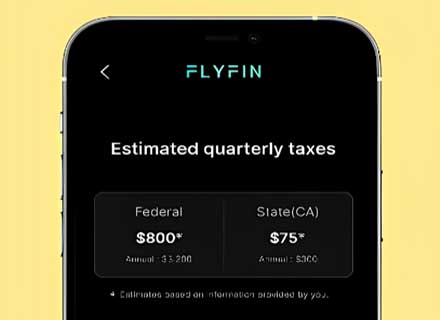While being a freelancer brings benefits like own job hours, no deadline pressure and the choice to work from remote locations, the biggest con is proving the source of income to mortgage lender/tax authorities.
California-based FlyFin, established in 2020, is a fintech start-up, leveraging the power of artificial intelligence, that is helping its users prepare and file taxes.
The AI-powered tax preparation and filing service has combined the expertise of CPAs and AI to provide an expedited, automated tax solution for freelancers/self-employed individuals.
How Flyfin aces the tax filing job?
FlyFin’s AI analyzes the expenses of the freelancers, identifying every tax write-off based on over 200 deduction categories in the process.
All a self-employed individual needs to do is upload his/her tax documents, so that the CPAs (Certified Public Accountants) associated with the Flyfin can customize the papers for creating the client’s tax profile.
“With a combined 250 years of experience in all aspects of US taxes, our tax team ensures 100% accurate tax review, preparation and filing,” stated the fintech venture.
“With a unique combination of A.I. and a CPA team that understands the complexities of how to file 1099 for self-employed individuals, freelancers and independent contractors, FlyFin changes the game for self-employed individuals, freelancers and independent contractors. Together, A.I. and CPAs take the work and the stress of how to file a 1099 taxes away from taxpayers and save them more on taxes than in previous years,” it commented further.
After a self-employed individual enters their business expenses on the FlyFin portal, the latter’s AI searches for every deductible business expense to that extent, where it can even catch the smallest account write-offs. The more deductions the FlyFin AI finds, it lessens the concerned person’s taxable income further, ultimately resulting in the individual paying less taxes.
In short, the AI becomes a freelancer’s bookkeeper in the FlyFin, thus assigning each deduction it finds to an IRS (US Internal Revenue Service) category based on over one million tax rules the federal tax agency has.
“You can accept or recategorize to ensure accuracy and help A.I. learn over time, so when it comes time to file a 1099 online and submit your annual return, you’re as ready as humanly (and A.I.-ly) possible,” the fintech platform said.
FlyFin’s AI even looks at digital records of purchases freelancers made for their businesses. All the information needed for tax filing is accessed digitally by AI, and those digital records are the things required by the US Internal Revenue Service for verification.
After a thorough review of freelancers’ tax profiles and deductions, FlyFin’s CPA team sends those individuals a list of the documents to securely upload so that the accountants can e-file every 1099 NEC on the freelancers’ behalf and prepare their clients’ tax returns.
In the next step, FlyFin’s CPA team begins the process of preparing and submitting their clients’ 1099 electronic filing. The freelancers need to answer a few questions about their tax profile, so that the CPAs can tailor their approach to individual tax situations.
“The CPA team reviews all your business expenses and deductions to ensure 100% accuracy in your tax return. The most accurate possible tax return makes your taxable income as low as possible, so you save as much on your taxes as possible and avoid anything on your return that would attract the attention of the IRS. Pro tip: a red flag now can have implications for several tax returns in the future, which means being careful now helps you maximize your tax savings in the long run,” FlyFin commented.
The CPA team takes a maximum turnaround time of 48 hours, when it comes to sending the customers their return reviews and completes the tax filing process.
And yes, Flyfin has a section called ‘Calculate Taxes’ on its website, where all the important tax terms and calculation metrics, which the freelancers need to know, have been explained in detail.
FlyFin has even curated a list of common tax deductions that a freelancer can apply for, apart from drawing up specialised deduction guidance for artists, personal fitness trainers, uber drivers, Airbnb hosts, massage therapists, real estate agents and other self-employed categories.
Welcome to ‘FlyFin TaxGPT’
Using the best of the generative AI, FlyFin has introduced ‘FlyFin TaxGPT’, a chatbot which will answer all the tax-related queries for freelancers/self-employed individuals.
‘FlyFin TaxGPT’ is a new generative service, which is based on OpenAI’s GPT-4 large multi-modal model.
While ‘FlyFin TaxGPT’ can be used without hurting your purses, the tool doesn’t require its clients to create user accounts. An individual just needs to type in their tax-related questions on the chatbot. ‘FlyFin TaxGPT’ will then ask a few questions to the respondents before generating a tailored response to the tax queries in seconds.
‘FlyFin TaxGPT’ and its data model also keep its users constantly updated with the new tax laws and amendments. The service will be integrated into FlyFin’s AI-based tax engine and app in the coming days.
The road ahead
FlyFin has eliminated the biggest headache of self-employed individuals, i.e., preparing their tax records, apart from staying updated with the latest tax reforms.
Jaideep Singh, the FlyFin CEO, has established himself as an accomplished entrepreneur and venture capitalist. Singh is also a noted personality in the field of AI. He has been assisted by Sachin Rajendra, FlyFin’s co-founder and CTO, who brings a wealth of expertise in AI/Machine Learning (ML).
As strategic use of AI becomes the new normal for the fintech sector, expect FlyFin to introduce more disruptive services like ‘FlyFin TaxGPT’ in the coming days.

